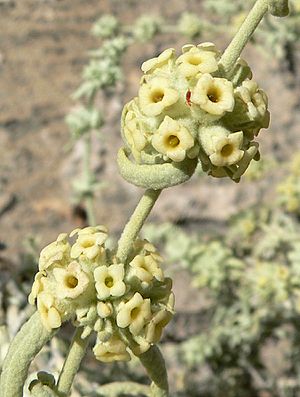Utah butterfly bush facts for kids
Quick facts for kids Utah butterfly bush |
|
|---|---|
 |
|
| Scientific classification |
|
| Kingdom: | Plantae |
| Clade: | Tracheophytes |
| Clade: | Angiosperms |
| Clade: | Eudicots |
| Clade: | Asterids |
| Order: | Lamiales |
| Family: | Scrophulariaceae |
| Genus: | Buddleja |
| Species: |
B. utahensis
|
| Binomial name | |
| Buddleja utahensis Coville
|
|
| Script error: The function "autoWithCaption" does not exist. | |
Script error: No such module "Check for conflicting parameters".
The Buddleja utahensis is a special kind of plant. It's a type of Buddleja, also known as a butterfly bush. This plant grows naturally only in the southwestern United States. You can find it in parts of Arizona, California, Nevada, and Utah. People often call it the Utah butterfly bush or Panamint butterfly bush.
A scientist named Coville first described this plant in 1892. It likes to grow on rocky hills, especially where there's limestone. It grows at heights between 700 and 2,000 meters (about 2,300 to 6,500 feet). You might even see it growing near Joshua trees!
What Does the Utah Butterfly Bush Look Like?
The Utah butterfly bush is a small, bushy plant. It usually grows to be about 0.3 to 1 meter (1 to 3 feet) tall. Its bark is grey and has cracks. Even when the leaves fall off, some bare twigs stay on the plant.
The younger branches are round. They have small leaves that are long and narrow. These leaves are about 1.5 to 3.5 centimeters (0.6 to 1.4 inches) long. They are about 0.3 to 0.5 centimeters (0.1 to 0.2 inches) wide. The leaves are rounded at the tip and get narrower at the base. Both sides of the leaves are covered in short, soft hairs. This gives the plant a cool silver-grey look.
Flowers and Seeds
The flowers grow in clusters called inflorescences. These clusters are 4 to 12 centimeters (1.6 to 4.7 inches) long. They have 3 to 7 pairs of flower heads. These heads form rings around the stem. Green leaves, called bracts, grow beneath these flower rings.
Each flower ring is about 0.5 to 1.13 centimeters (0.2 to 0.4 inches) wide. Inside each ring, there are 15 to 30 pale yellow flowers. The petals of these flowers, called corollas, are about 4 to 5 millimeters (0.16 to 0.2 inches) long. After the flowers, the plant makes small seed pods. These pods are up to 2.5 millimeters (0.1 inches) long. Each pod holds many tiny, round seeds. The seeds are very small, only about 0.4 millimeters (0.016 inches) across.
The Utah butterfly bush is a dioecious plant. This means that some plants have only male flowers, and other plants have only female flowers. Both male and female plants are needed to make seeds.
Growing the Utah Butterfly Bush
It is very rare to find the Utah butterfly bush growing in gardens. It can be a tricky plant to grow in places with different climates. This plant needs soil that drains water very well. It also does not need much water.
This plant can survive in certain climates. Gardeners use something called a hardiness zone to know where plants can grow. The Utah butterfly bush can grow in USDA zone 8. This means it can handle temperatures down to about -12 to -7 degrees Celsius (10 to 20 degrees Fahrenheit).
 | Roy Wilkins |
 | John Lewis |
 | Linda Carol Brown |

